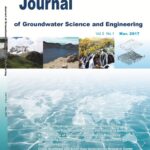
Changes in the climatic system introduce uncertainties in the supply and management of water resources. Climate change has direct impacts on the surface water and the control of storage in rivers, lakes and reservoirs, which indirectly controls the groundwater recharge process. The main and direct impact of climate change on groundwater is changes in the volume and distribution of groundwater recharge. The impact of climate change on groundwater resources requires reliable forecasting of changes in the major climatic variables and accurate estimations of groundwater recharge. A number of Global Climate Models (GCMs) are available for understanding climate and projecting climate change. These GCMs can be downscaled to a basin scale, and when they are coupled with relevant hydrological models, the output of these coupled models can be used to quantify the groundwater recharge, which will facilitate the adoption of appropriate adaptation strategies under the impact of climate change.
Read Full Review>>> https://www.mekonginstitute.org/fileadmin/user_upload/Mekong_Institute/PDFs/Climate_change_and_groundwater_conditions_in_the_Mekong_Region_E2_80_93A_review.pdf






